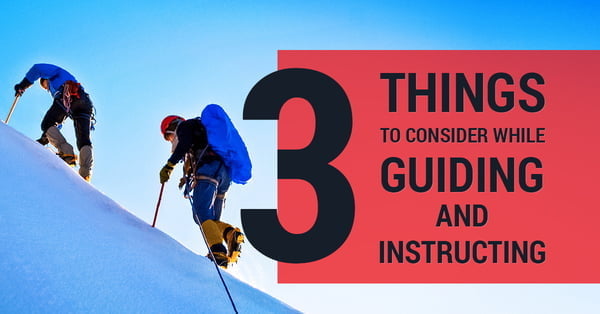
Dmitry Sidorov
58 years, United States
3 THINGS TO CONSIDER WHILE GUIDING AND INSTRUCTING

Today I continue a series of articles discussing 3 main and most relevant/timeless/important in my (very modest) opinion (aka MVMO :-) points for a selected subject/question/technique etc related to guiding/instructing and mountaineering in general.
MVMO started developing 40+ ago when my parents - both instructors of alpinizm in the USSR state-run climbing school - started taking me to summer climbing camps where they were teaching climbing courses and I was having a lot of fun. (This remarkable story deserves a separate article which is coming soon - pls stay tuned.)
Ok, let’s chat about 3 things I always do while guiding and instructing - they are:
1. Trades places with the student;
2. Clearly state goals and expectations;
3. Delegate tasks and share responsibilities;
Now, let's break it down.
Trading places... I don't actually let my students guide me. It is just whenever I have a chance to take a guided tour of some sort or instructional course - I do it. Coffee plantation tour in Columbia, bee farm in Hawaii, local art museum, online programming language course etc. What and where doesn't matter. What matters is committing yourself to a 'guide' and allow him/her to take you places and explain things. While on the tour I pay close attention to what keeps me engaged and what makes me bored, how and why I loose the guide, how knowledgeable/sincere/passionate the guide is etc. Some guides are like a fire hose. They tell you everything they know drowning you in all sort of details. They make banal canned jokes and laugh whereas the group remains somber and silent. Other guides probe you for your knowledge of the subject and cater to your area/depth of interest. Realizing that I may be or could be doing the same things to my clients is very humbling and sometimes terrifying. I use these observations to scrutinize and improve my guiding.
Goals and expectations... When we first meet with clients/students, after brief introduction, I state my own goals/expectation for the course/climb and ask co-guides/clients/student to do the same. I write those goals in my field notebook.
While on the course, every day in the morning I clearly state our goals/objectives for the day and reasoning behind selecting them. I try to link those objectives to the goals from the beginning of the course and orchestrate learning and intentional living in the mountains. In the evening We debrief the day discussing the accomplishments and failures and making plans for next day. Before every class I state our goals/objectives and what student should know and be able to do at the end of the class.
We live in the goal oriented world. Even while vacating on a beach and definitely while pursuing high adrenaline activities we explicitly or unconsciously set goals and strive to accomplish them. It usually feels great when we do, and may feel not so great when we don't. Right? It's impossible to succeed or track progress if there is no a goal or a base line.
Goals can be as simple and implicit as ‘wake up, get up, drink coffee, dress up, go to work’ or elaborate and explicit as ‘get up at 6:15, get to work by 7:45, write a 500-word blogpost by noon’ etc.
Having clear goals at all levels: climb/day/lesson - helps to focus on what is important and discriminate against what is irrelevant.
Delegating responsibilities... When you do things just for yourself is different from when you have to think about and do things for others. When somebody tells you what/how to do something is different from when you decide what/how to do it.
I encourage my students to take charge and take chances where appropriate and use the course as a test lab to learn by doing/making including making mistakes.
I do hope that my courses/climbs will be remembered for a long time and for more than just a view from the summit. It is personally important to me that adventures in the mountains have long lasting effects on lives of all involved including my own life.
CONCLUSION...
As a lead guide I have complex workplace environment with laws/regulation, physical and technical limitations of individuals and the group, environmental/meteorological factors, and various goals/objectives to balance and fulfill. If I can stay focused on what is necessary and important, gradually increase difficulty and complexity of the tasks, be a resource to my students, share duties and have fun - my job remains fresh and fulfilling.




